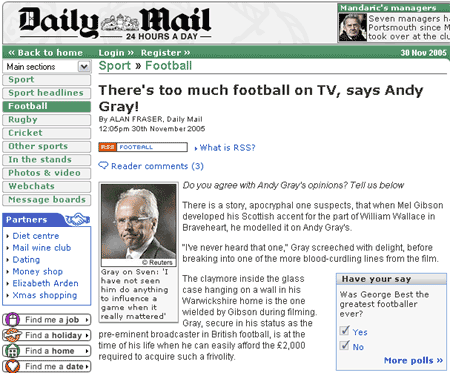RSS and Reader Comments on the Daily Mail site
For a long time I don't think the Daily Mail and Associated New Media were really sure about the strategic direction of the online version of the paper, but recently they've been making what I think are some very interesting moves.
Firstly they are really pushing their RSS feeds into the face of the audience, with prominent RSS icons and a very clear help page:
There are several ways of receiving RSS feeds, but the technology is moving forwards and adapting very quickly. The main method is to download a program called a 'News Reader'. You can then set up this program to receive RSS information from whatever websites you wish that offer it, and browse headlines and story summaries that link through to the full story on the website.
There are several News Reader programs available for all platforms, many of which are free. See a list here.
Alternatively, some newer web browsers offer similar functionality already built-in which will detect whether the website you are viewing offers an RSS feed and will then let you create a constantly-updated list of links in your 'bookmarks' menu.
The Firefox browser (Windows, Mac OSX, Linux) will let you do this, and will alert you to an RSS-enabled page by displaying an icon in the bottom-right corner of the window Firefox RSS link. Apple's Safari browser (Mac OSX only) offers an even fuller service, and other browsers will probably follow.

Mind you, having said that all that, thanks to the weird way the adverts are loaded in, the site still renders like a flickery dog in Firefox. I also like the fact that the help page pushing RSS technology in common with most Daily mail pages has in the footer 'Have your Daily Mail and Mail on Sunday delivered to your door. To find out more click here'. Good old-fashioned analogue push technology I suppose.
The second interesting development is that they currently seem to be really embracing the concept of user-generated content.
They now have comments attached directly to the majority of the online stories. This pushes it more and more to be blog-like, rather than an online newspaper, with every story effectively becoming the first post in a message-board thread. They use editorial choice to put a selection of comments onto the article itself, with the option to view all of the comments on a story. The registration required is refreshingly light-touch, and comments seem to get published to live very quickly. Each article also carries a comment-count on the front page.

Of course one of the risks of emphasising so much your user-generated content is that you are a hostage to your audience. We know this is true at the BBC, where the Point of View board and the Have Your Say section reverberate from voices certain that the BBC is both the pro-war mouthpiece of the Labour Government, and the pro-terrorism mouthpiece of al-Qaeda, and entirely staffed by left-wing Zionists. Or the really amusing occasions when someone is so paranoid that they try and sneak a controversial URL onto the POV board oblivious to the fact that the BBC now allows users to link to anywhere on the web providing it is neither illegal or offensive.
Likewise on the Mail site you can surely only think that this kind of post has been put up by someone sending up the cliché of the Daily Mail reader:
Drinking in the company of friends can be very enjoyable. Sometimes that involves drinking quite a bit. But I don't run around like a lunatic, spewing and brawling and smashing windows. If people lack the internal discipline to hold their drink, they should be derided and told to stick to orange juice. If they still transgress, they should be put in the stocks and given a damn good birching on the village green the next morning.
- F. Sticks, Parpbeech, UK
I did note though that glancing around there appears to be more of a homogeneity of user comment on the Daily Mail site. BBC message boards attract a really hardcore anti-BBC audience, whereas the Mail doesn't appear to have attracted a similar hardcore anti-Mail bandwagon.
I know very well the complexities around moderation at the BBC for legal and brand protection reasons. The Daily Mail community areas appear to rely on reactive moderation, and it is pretty hard to find out how to complain about a post. There is no 'Yikes!' button on the pages themselves, and only by trawling through the Terms & Condition do you find the address to send complaints, which asks you to cut and paste the offending comment in. At the BBC a post that gets alerted is automatically forwarded to our moderators with all the details they need to make a moderation judgement. All in all though I think this is a very brave move on their part, and it will be interesting to see if any other newspapers follow suit in really integrating their community message boards with their editorial content.
They do seem to be making a bit of an effort, but there are a couple of things about their site that I find strange.
Firstly, their RSS feeds break whenever they include a pound sign. They seem to be double-encoding HTML entities so you see £ instead of a pound sign when reading their feeds in something like Bloglines. I've emailed them about it, but I got no response.
Secondly (and this is something they have in common with other Associated Newspapers web sites) is the way that the front page stories from the paper often don't make it onto the web site. It's almost like they're happy to be as offensive as possible in print, but they get cold feet when it's on the web where they can be linked to and held to account. Try looking at the Daily Mail Watch site (http://www.bigdaddymerk.co.uk/mailwatch/) each day and comparing it with the Mail's own web site.
Oh dear. Looks like your blogging software is far too clever for me.
What I thought I'd said was that you see £ instead of a pound sign.
Sadam Hassein,
As the UK is a partner of the coalition force involved with the maintenace of law and order in Iraq and that the UK government and our society opposes the use of the death penalty it should declare a reluctance to support the use of the death penalty for Sadam Hassein.
No civilised society should administer the death penalty as a means of restribution.
Douglas Liddle
The UK opposes the use of a death penalty and